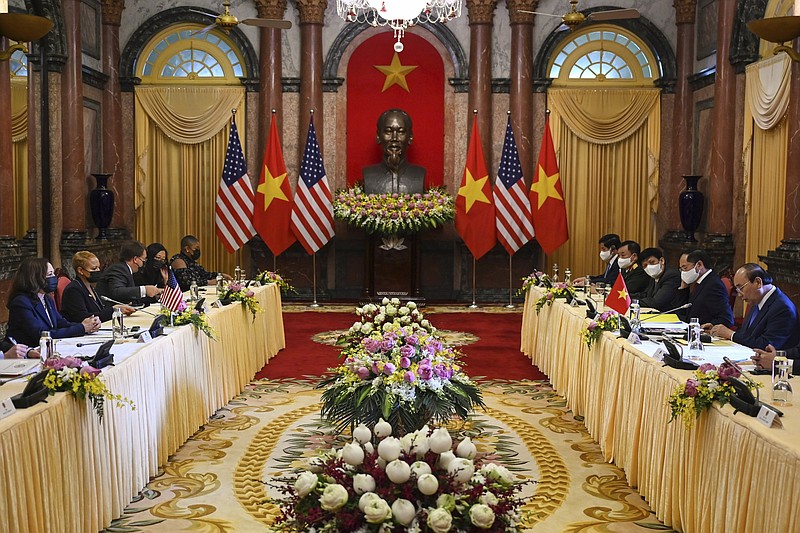Vice President Kamala Harris, on her second international trip in the role, got a taste of the intensifying rivalry between the United States and China as she flew into Vietnam -- a former U.S. adversary wary of Beijing's growing dominance and now courted by Washington.
Harris was en route Wednesday to announce, among other things, a donation of 1 million coronavirus vaccine doses to the pandemic-hit country. But a three-hour delay to her schedule handed China a window of opportunity.
Beijing quickly sent its envoy in Hanoi to meet with Vietnam's prime minister and pledged a donation of 2 million vaccine doses, undercutting the subsequent U.S. announcement. Prime Minister Pham Minh Chinh, thanking the envoy, said his country "does not ally with one country to fight against another," according to state media.
The incident underscored the challenges facing the Biden administration as Harris has made her way through Southeast Asia this week, along with Chinese sensitivity about her visit. Washington's agenda does not always align with that of governments in the region, which face a diplomatic high-wire act in balancing the competing interests of the U.S. and China -- the latter being Vietnam's top trading partner.
"Beijing likes to remind Hanoi who of the two giants is closer to it," said Huong Le Thu, a senior analyst at the Australian Strategic Policy Institute.
[Video not showing up above? Click here to watch » https://www.youtube.com/watch?v=e1WSgMt6BWw]
The trip was intended to demonstrate a U.S. pivot to the Indo-Pacific amid the chaotic collapse of the Western-backed government in Afghanistan and resulting questions about Washington's commitment to its allies. China has seized on the turmoil to taunt the U.S. and label it an unreliable partner. But Beijing is also wary of American overtures to Vietnam, a fast-growing nation of 100 million with which it has competing territorial claims in the South China Sea.
Though Vietnam wants the U.S. to be stronger in resisting China's militarization of the disputed waterway, some in Vietnam's leadership would be hesitant to be seen as part of a Washington-led effort simply to counter their giant neighbor, Le Thu said.
For the second day in a row, Harris accused China of aggression in the South China Sea. Speaking at a bilateral meeting in Hanoi with Nguyen Xuan Phuc, Vietnam's president, Harris said there was a need to "raise the pressure" on Beijing's actions "and to challenge its bullying and excessive maritime claims."
Chinese Foreign Ministry spokesman Wang Wenbin, responding to a question about Washington's support for Vietnam in the South China Sea, said the U.S. "arbitrarily launched military intervention in Afghanistan, Iraq and Syria, while claiming to defend the interests of smaller countries."
"I think it would be much more credible if the U.S. said it was trying to maintain its hegemony and uphold its own interests," he said.
The U.S. has contested the Chinese claims through freedom-of-navigation naval operations, noting the need to safeguard the billions of dollars in trade that flows through shipping lanes that connect East Asia with the Indian Ocean.
The vice president also spoke about upgrading the relationship between Vietnam and the United States to a "strategic partnership" and announced the donation of coronavirus vaccine doses, which she said would begin to arrive in the next 24 hours.
DELAYED ARRIVAL
Harris' arrival in Hanoi was delayed after the U.S. Embassy in Vietnam said it had detected a "possible anomalous health incident" in the city, a phrase that Washington uses to describe the Havana syndrome. This is the name for a rash of mysterious health incidents first reported by American diplomats and other government employees in the Cuban capital beginning in 2016.
U.S. officials had not yet confirmed the latest reported Havana syndrome case, and it did not involve anyone traveling with Harris, White House press secretary Jen Psaki said Tuesday.
There have been two separate cases of unexplained health incidents reported by U.S. personnel in Vietnam within the past week, U.S. officials said.
Harris didn't weigh in directly on the Havana syndrome situation.
Some of those affected by Havana syndrome report hearing a loud piercing sound and feeling intense pressure in the face. Pain, nausea, and dizziness sometimes follow.
Similar ailments have been reported by Americans serving in other countries, including Germany, Austria, Russia and China. A variety of theories have been floated to explain the incidents, including targeted microwaves or sonic attack, perhaps as part of an espionage or hacking effort.
Particularly alarming are revelations of at least two possible incidents in the Washington area, including one case near the White House in November in which an official reported dizziness. Administration officials have speculated that Russia may be involved, a suggestion Moscow has denied.
Information for this article was contributed by Shibani Mahtani and Lyric Li of The Washington Post and by Alexandra Jaffe, Jonathan Lemire, Matthew Lee and Lisa Mascaro of The Associated Press.

